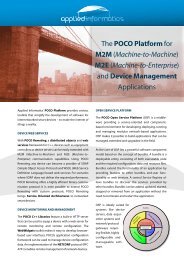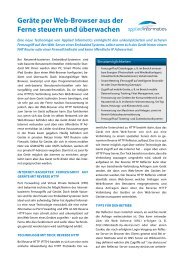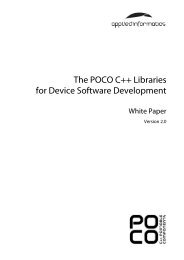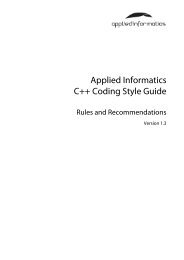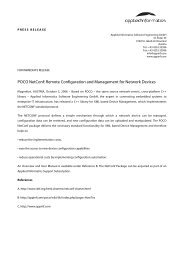Designing and Building Portable Systems in C++ - Applied Informatics
Designing and Building Portable Systems in C++ - Applied Informatics
Designing and Building Portable Systems in C++ - Applied Informatics
Create successful ePaper yourself
Turn your PDF publications into a flip-book with our unique Google optimized e-Paper software.
While this namespace pollution issue is worst on W<strong>in</strong>dows – many c<strong>and</strong>idates for good<br />
method names are already names of W<strong>in</strong>dows API functions – it can also happen on other<br />
platforms. A good way to avoid this problem as much as possible is to use method names that<br />
start with a lower case letter.<br />
3.2 POSIX<br />
The name POSIX, pronounced pahz-icks, is an acronym for <strong>Portable</strong> Operat<strong>in</strong>g System<br />
Interface. It orig<strong>in</strong>ally referred to IEEE Std 1003.1-1988, the first outcome of a<br />
st<strong>and</strong>ardization effort started <strong>in</strong> 1985 by a bunch of Unix vendors, but nowadays refers to a<br />
whole family of st<strong>and</strong>ards: IEEE Std 1003.n. To avoid ambiguities, the 1003.1 st<strong>and</strong>ard is<br />
often referred to as POSIX.1. It describes the programm<strong>in</strong>g <strong>in</strong>terface to the operat<strong>in</strong>g system,<br />
<strong>and</strong> thus is the only st<strong>and</strong>ard <strong>in</strong>terest<strong>in</strong>g from a system programm<strong>in</strong>g po<strong>in</strong>t of view.<br />
POSIX.1 is also an <strong>in</strong>ternational st<strong>and</strong>ard of the International Organization for<br />
St<strong>and</strong>ardization, published as ISO/IEC 9945. In other words, the correspond<strong>in</strong>g revisions of<br />
IEEE Std 1003.1 <strong>and</strong> ISO/IEC 9945 are the same.<br />
Over the years POSIX.1 underwent several revisions, <strong>in</strong> 1990 (<strong>in</strong>corporat<strong>in</strong>g ANSI C), 1992,<br />
1996, 2001 <strong>and</strong> 2003. A few amendments were created as well, which were later on merged<br />
back <strong>in</strong>to the ma<strong>in</strong> text. Examples are POSIX.1b-1993 Realtime Extension, <strong>and</strong> POSIX.1c-<br />
1995 Threads.<br />
As implied by its name, POSIX does not describe the implementation of an operat<strong>in</strong>g system,<br />
but rather the programm<strong>in</strong>g <strong>in</strong>terfaces an operat<strong>in</strong>g system must provide to its applications.<br />
Therefore, a POSIX compliant operat<strong>in</strong>g system need not have anyth<strong>in</strong>g to do with the classic<br />
Unix System V or BSD implementations. For example, W<strong>in</strong>dows NT had a POSIX subsystem<br />
(that later was removed with the release of W<strong>in</strong>dows XP), <strong>and</strong> QNX, although technically not<br />
a Unix system, is fully POSIX compliant.<br />
Among other th<strong>in</strong>gs, POSIX specifies the name, signature <strong>and</strong> semantics of well over 1000<br />
functions, as well as the name <strong>and</strong> location of the correspond<strong>in</strong>g C header files. It does not<br />
dist<strong>in</strong>guish between system calls <strong>and</strong> st<strong>and</strong>ard library functions, so implementations are free<br />
to implement the functions <strong>in</strong> the way that best suits them.<br />
The POSIX st<strong>and</strong>ard has been widely adopted by vendors of embedded/real-time operat<strong>in</strong>g<br />
systems. Some of these operat<strong>in</strong>g systems offer native POSIX-compliant APIs, like QNX or<br />
Integrity. Others, for example VxWorks, provide compatibility libraries that implement<br />
POSIX <strong>in</strong>terfaces on top of the native operat<strong>in</strong>g system APIs. Nevertheless, there are<br />
operat<strong>in</strong>g systems without any support for POSIX.<br />
3.3 An Object-Oriented Operat<strong>in</strong>g System API<br />
For pure C development, the POSIX APIs may be sufficient as a portable <strong>in</strong>terface to the<br />
operat<strong>in</strong>g system, even if it means that a POSIX compatibility layer may need to be written<br />
for some systems. In contrast, for <strong>C++</strong> development, an object-oriented <strong>in</strong>terface to the<br />
operat<strong>in</strong>g system that uses <strong>C++</strong> features to their full extent (classes, exception h<strong>and</strong>l<strong>in</strong>g) is<br />
desirable, as it significantly reduces the complexity of work<strong>in</strong>g with an operat<strong>in</strong>g system API,<br />
<strong>in</strong> addition to act<strong>in</strong>g as an abstraction layer that improves code portability.<br />
3.3.1 Abstract<strong>in</strong>g Operat<strong>in</strong>g System Facilities<br />
As an example that shows how an operat<strong>in</strong>g system facility can be wrapped <strong>in</strong> a <strong>C++</strong> class, a<br />
Mutex class implement<strong>in</strong>g a mutual-exclusion object or b<strong>in</strong>ary semaphore is used <strong>in</strong> the<br />
rema<strong>in</strong>der of this section. The Mutex class is straightforward <strong>and</strong> looks as follows:<br />
11




